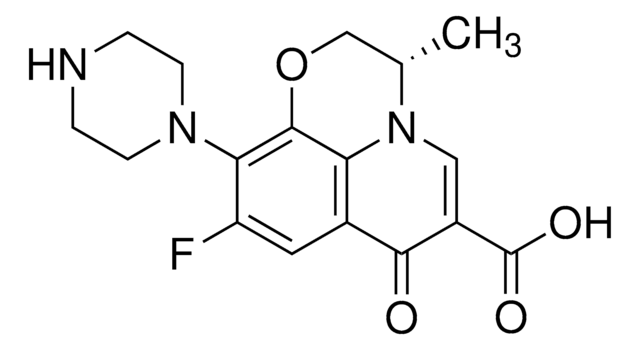おすすめの製品
グレード
pharmaceutical primary standard
APIファミリー
griseofulvin
メーカー/製品名
USP
アプリケーション
pharmaceutical (small molecule)
フォーマット
neat
保管温度
2-8°C
SMILES記法
ClC1=C(O[C@@]2(C(OC)=CC(C[C@H]2C)=O)C3=O)C3=C(OC)C=C1OC
InChI
1S/C17H17ClO6/c1-8-5-9(19)6-12(23-4)17(8)16(20)13-10(21-2)7-11(22-3)14(18)15(13)24-17/h6-8H,5H2,1-4H3/t8-,17+/m1/s1
InChI Key
DDUHZTYCFQRHIY-RBHXEPJQSA-N
類似した製品をお探しですか? 訪問 製品比較ガイド
詳細
この製品は薬局方標準品です。発行元の薬局方により製造・供給されています。詳しい情報は、発行元の薬局方のウェブサイトよりご確認ください。
アプリケーション
Griseofulvin Permeability Diameter USP reference standard, intended for use in specified quality tests and assays as specified in the USP compendia. Also, for use with USP monograph such as Griseofulvin
アナリシスノート
These products are for test and assay use only. They are not meant for administration to humans or animals and cannot be used to diagnose, treat, or cure diseases of any kind.
その他情報
Sales restrictions may apply.
関連製品
製品番号
詳細
価格
シグナルワード
Danger
危険有害性情報
危険有害性の分類
Carc. 2 - Repr. 1B - Skin Sens. 1
保管分類コード
6.1C - Combustible acute toxic Cat.3 / toxic compounds or compounds which causing chronic effects
WGK
WGK 3
引火点(°F)
Not applicable
引火点(℃)
Not applicable
適用法令
試験研究用途を考慮した関連法令を主に挙げております。化学物質以外については、一部の情報のみ提供しています。 製品を安全かつ合法的に使用することは、使用者の義務です。最新情報により修正される場合があります。WEBの反映には時間を要することがあるため、適宜SDSをご参照ください。
労働安全衛生法名称等を表示すべき危険物及び有害物
名称等を表示すべき危険物及び有害物
労働安全衛生法名称等を通知すべき危険物及び有害物
名称等を通知すべき危険物及び有害物
Jan Code
1299200-2G:
最新バージョンのいずれかを選択してください:
Mark Sacchetti
Journal of pharmaceutical sciences, 103(9), 2772-2783 (2013-12-12)
Pharmaceutical materials, crystalline and amorphous, sorb water from the atmosphere, which affects critical factors in the development of drugs, such as the selection of drug substance crystal form, compatibility with excipients, dosage form selection, packaging, and product shelf-life. It is
Damir Elmar Zecevic et al.
European journal of pharmaceutics and biopharmaceutics : official journal of Arbeitsgemeinschaft fur Pharmazeutische Verfahrenstechnik e.V, 87(2), 264-270 (2014-04-29)
Many upcoming drug candidates are pH-dependent poorly soluble weak bases in the pH range of the gastrointestinal tract. This often leads to a high in vivo variability and bioavailability issues. Aiming to overcome these limitations, the design of solid dispersions
Dipy M Vasa et al.
Journal of pharmaceutical sciences, 103(9), 2911-2923 (2014-05-16)
Fifteen model drugs were quenched from 3:1 (w/w) mixtures with polyethylene glycol 4000 (PEG4000). The resulting solids were characterized using powder X-ray diffraction (PXRD), analysis of pair distribution function-transformed PXRD data (where appropriate), hot-stage polarized light microscopy, and differential scanning
Kayo Yuminoki et al.
Journal of pharmaceutical sciences, 103(11), 3772-3781 (2014-09-12)
In this study, we reported the application of Povacoat®, a hydrophilic polyvinylalcohol copolymer, as a dispersion stabilizer of nanoparticles of poorly water-soluble compounds. In addition, the influence of aggregation of the nanoparticles on their solubility and oral absorption was studied.
Niraj S Trasi et al.
The journal of physical chemistry. B, 118(33), 9974-9982 (2014-07-31)
Amorphous forms of drugs are increasingly being used to deliver poorly water-soluble compounds. Therefore, understanding the magnitude and origin of differences in crystallization kinetics is highly important. The goal of this study was to better understand the factors that influence
ライフサイエンス、有機合成、材料科学、クロマトグラフィー、分析など、あらゆる分野の研究に経験のあるメンバーがおります。.
製品に関するお問い合わせはこちら(テクニカルサービス)






